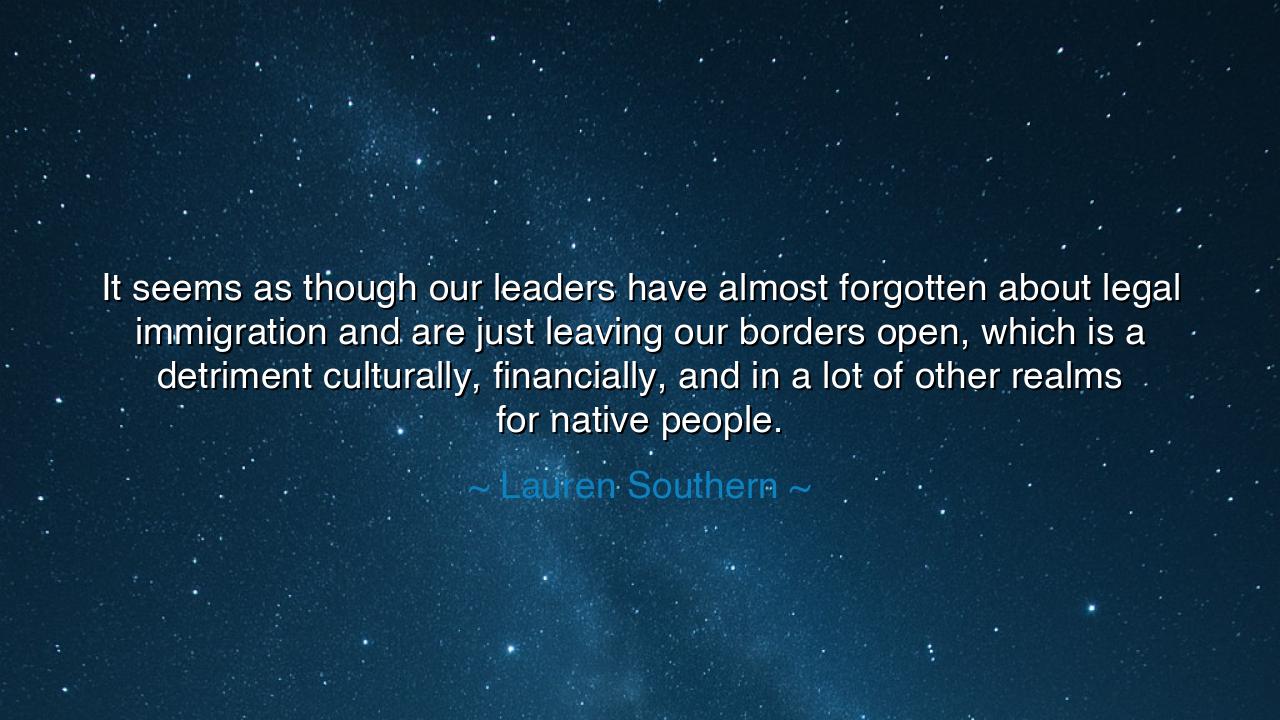
It seems as though our leaders have almost forgotten about legal
It seems as though our leaders have almost forgotten about legal immigration and are just leaving our borders open, which is a detriment culturally, financially, and in a lot of other realms for native people.






The words of Lauren Southern carry the tone of warning and vigilance: “It seems as though our leaders have almost forgotten about legal immigration and are just leaving our borders open, which is a detriment culturally, financially, and in a lot of other realms for native people.” In this statement lies a concern that stretches across the ages — the tension between openness and order, between the natural flow of human movement and the responsibilities of those who govern. Southern’s observation is a lament that leaders, entrusted with safeguarding the welfare of their citizens, may at times neglect the careful balance required to maintain social cohesion, economic stability, and cultural identity.
The origin of this reflection lies in contemporary debates over immigration policy in Western nations, where debates rage between openness and restriction, inclusion and regulation. Southern emphasizes that unchecked or poorly managed migration can have consequences that are cultural, financial, and societal, affecting native populations in ways that extend beyond the immediate political discourse. Her words reflect the ancient understanding that the prosperity and stability of a society require foresight, discipline, and deliberate governance — qualities as vital today as they were in the city-states of Greece or the empires of Rome.
In the annals of history, the lessons of migration and borders are abundant. Rome, at the height of its power, allowed vast numbers of foreigners into the empire to serve as soldiers, laborers, and citizens. In the beginning, this infusion brought vigor and diversity. Yet over time, the lack of regulation and assimilation contributed to political instability, economic strain, and cultural fragmentation. Southern’s warning echoes this truth: when legal immigration is neglected and borders are left without careful oversight, the long-term cohesion of a society can be undermined, even if immediate benefits seem apparent.
Southern’s argument is also rooted in the distinction between legal and illegal immigration, a concept as old as civilization itself. In ancient societies, entry into a city or kingdom was often strictly controlled, with rituals, documentation, and pledges of allegiance marking the transition from outsider to citizen. The purpose was not to exclude out of malice, but to ensure that newcomers contributed to the common good rather than destabilized it. Modern parallels are evident in Southern’s statement: legal pathways allow for orderly integration, while unregulated entry can strain resources, challenge social systems, and create tension between new arrivals and native populations.
A vivid example can be found in the 19th-century United States, when waves of immigrants arrived during the Industrial Revolution. Those who entered through regulated programs, settled, and contributed to the economy helped build thriving communities. Conversely, periods when immigration was poorly managed — or left unregulated — often produced overcrowding, competition for scarce jobs, and social unrest. Southern’s words evoke this historical memory: unchecked borders, while seemingly generous, can produce unintended consequences if not paired with structured, fair, and enforceable policies.
Her statement also touches upon the cultural dimension of migration. Societies are not mere economic units; they are communities bound by shared practices, language, and values. Rapid or unregulated influxes can challenge cultural cohesion, leading to friction and misunderstanding. Southern’s warning reminds us that leaders must consider not only the legal and financial frameworks of migration but also the deeper human and cultural effects. Wise governance balances humanitarian principles with the preservation of social harmony, ensuring that all who enter are integrated meaningfully.
The lesson to be drawn from Southern’s reflection is timeless: leaders must exercise foresight, citizens must remain vigilant, and policies must be guided by both compassion and pragmatism. Legal immigration, properly managed, benefits both newcomers and native populations by promoting stability, economic contribution, and cultural enrichment. Neglecting these structures, she warns, can harm the very society that seeks to welcome. The principle is ancient: the health of a community depends not on unregulated generosity alone, but on deliberate stewardship and foresight.
Thus, let the words of Lauren Southern resonate as counsel for generations: borders are not merely lines on a map, but lifelines of culture, economy, and society. Open them wisely, regulate them fairly, and respect the processes that allow integration to flourish. For a society that balances openness with law, generosity with order, and compassion with foresight ensures that both newcomers and native citizens thrive, preserving peace, prosperity, and shared identity for the future.






AAdministratorAdministrator
Welcome, honored guests. Please leave a comment, we will respond soon